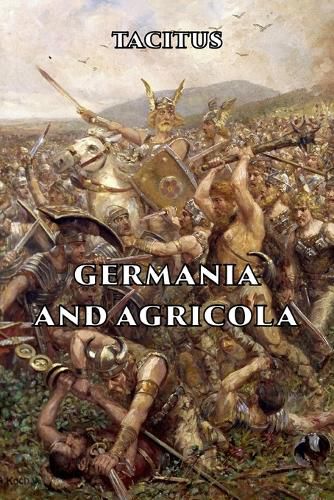Readings Newsletter
Become a Readings Member to make your shopping experience even easier.
Sign in or sign up for free!
You’re not far away from qualifying for FREE standard shipping within Australia
You’ve qualified for FREE standard shipping within Australia
The cart is loading…






This title is printed to order. This book may have been self-published. If so, we cannot guarantee the quality of the content. In the main most books will have gone through the editing process however some may not. We therefore suggest that you be aware of this before ordering this book. If in doubt check either the author or publisher’s details as we are unable to accept any returns unless they are faulty. Please contact us if you have any questions.
Translated by Alfred J. Church. This edition is NOT a "mass market printing" but a high-quality edition printed on white paper. Germania, or in its original Latin, "De Origine et situ Germanorum," is Roman historian Tacitus's in-depth account of the culture, tribal structure, society, and physical appearance of the ancient German tribes located to the east of the Rhine River, what the Romans called "Germania Magna" or "Greater Germany." Germania described the lands, laws, and customs of the individual German tribes from the Rhine River to the northern Baltic Sea, including full details on their systems of government, religion, the egalitarian status of women in German society, and even a form of folk assembly, or parliament, at which important decisions were made by common vote and consensus. It remains history's most valuable resource on that period. Agricola, or in its original Latin, "De vita et moribus Iulii Agricolae" is a biographical work based on the life of Tacitus's father-in-law, Gnaeus Julius Agricola, one of the most prominent Roman generals who took part in the final conquest of Britain. It provides many fascinating details of the Roman conquest of Britain, and of how Agricola served as governor of the new province. Publius Cornelius Tacitus (56 AD-120 AD) was a Roman senator and widely regarded as the most reliable and greatest of all Roman historians.
$9.00 standard shipping within Australia
FREE standard shipping within Australia for orders over $100.00
Express & International shipping calculated at checkout
This title is printed to order. This book may have been self-published. If so, we cannot guarantee the quality of the content. In the main most books will have gone through the editing process however some may not. We therefore suggest that you be aware of this before ordering this book. If in doubt check either the author or publisher’s details as we are unable to accept any returns unless they are faulty. Please contact us if you have any questions.
Translated by Alfred J. Church. This edition is NOT a "mass market printing" but a high-quality edition printed on white paper. Germania, or in its original Latin, "De Origine et situ Germanorum," is Roman historian Tacitus's in-depth account of the culture, tribal structure, society, and physical appearance of the ancient German tribes located to the east of the Rhine River, what the Romans called "Germania Magna" or "Greater Germany." Germania described the lands, laws, and customs of the individual German tribes from the Rhine River to the northern Baltic Sea, including full details on their systems of government, religion, the egalitarian status of women in German society, and even a form of folk assembly, or parliament, at which important decisions were made by common vote and consensus. It remains history's most valuable resource on that period. Agricola, or in its original Latin, "De vita et moribus Iulii Agricolae" is a biographical work based on the life of Tacitus's father-in-law, Gnaeus Julius Agricola, one of the most prominent Roman generals who took part in the final conquest of Britain. It provides many fascinating details of the Roman conquest of Britain, and of how Agricola served as governor of the new province. Publius Cornelius Tacitus (56 AD-120 AD) was a Roman senator and widely regarded as the most reliable and greatest of all Roman historians.